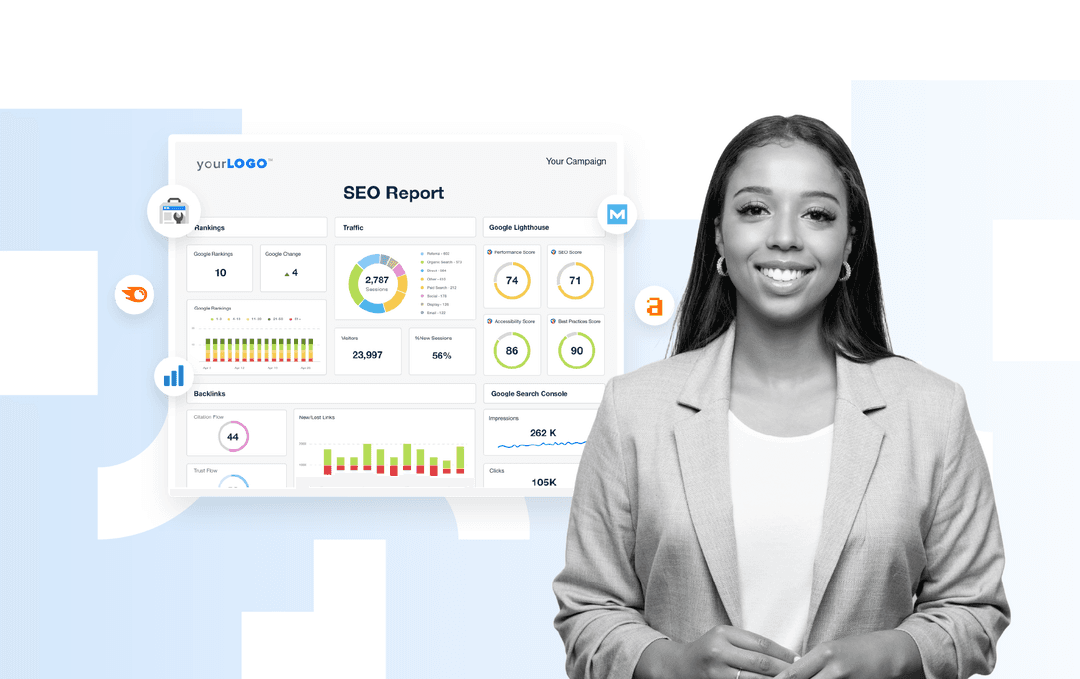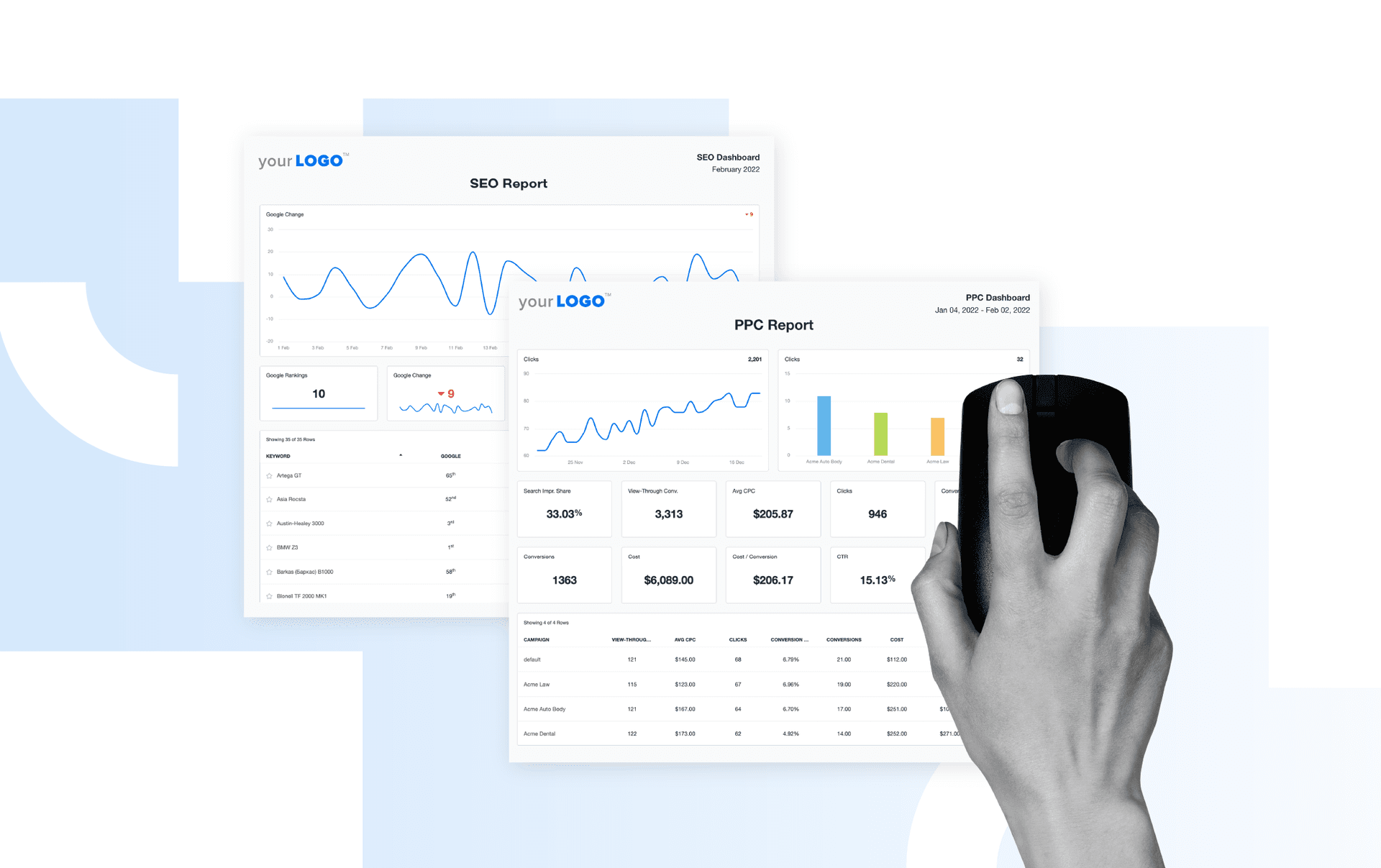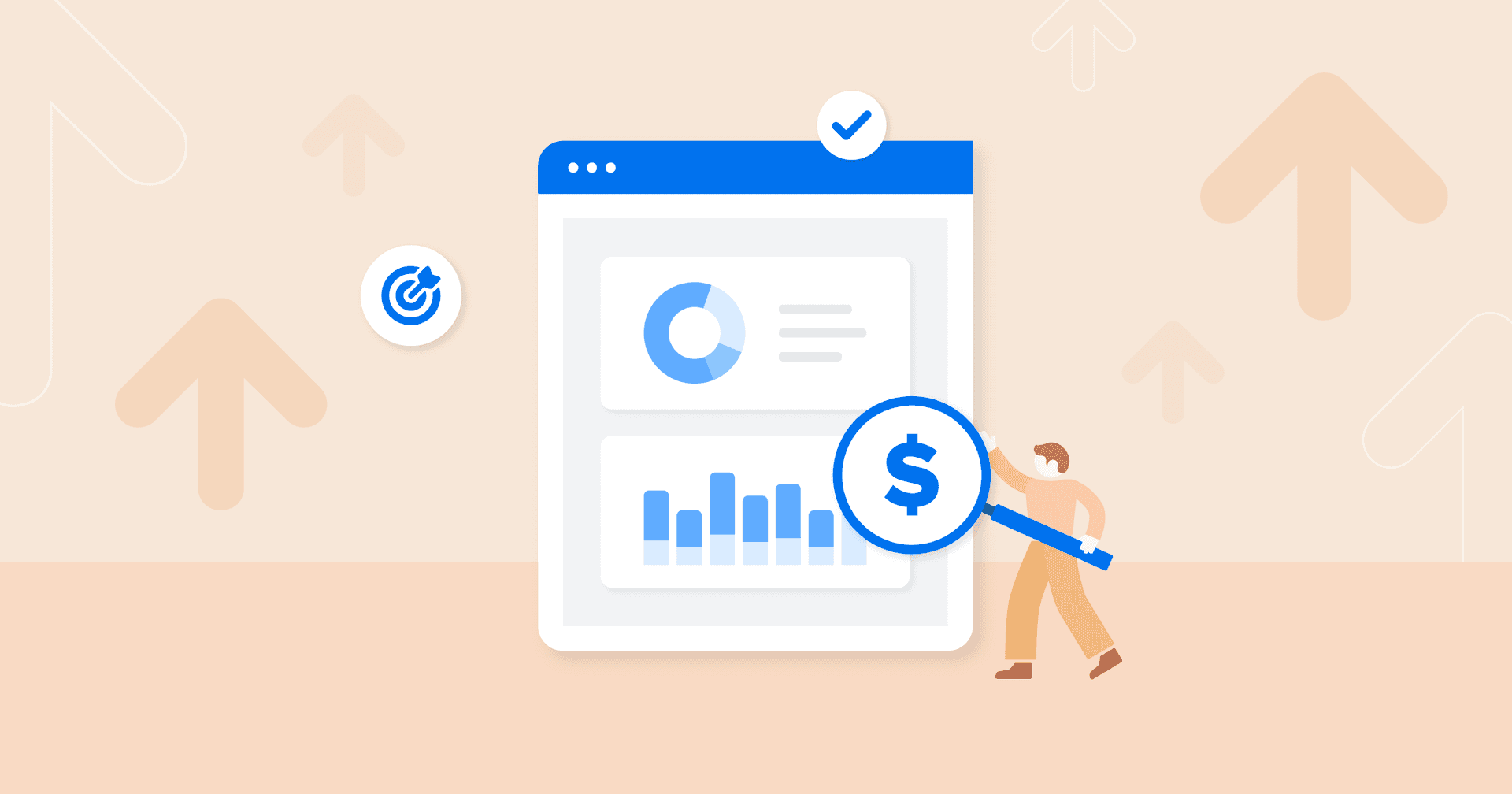Table of Contents
QUICK SUMMARY:
SEO trends in 2025 are shaped by AI, evolving search results, and changing user intent. SEO now touches every stage of a user’s search journey. AI-driven overviews, conversational platforms, branded authority signals, and social search are redefining visibility. This guide shows agencies how to adapt strategy, update reporting, and prepare teams for the AI revolution driving client growth.
Search is entering a new era. Google’s dominance is no longer absolute, AI-generated answers sit at the top of results, and younger audiences are treating TikTok, Reddit, and Discord like search engines of their own.
At the same time, brand mentions influence rankings as much as backlinks, and community-driven content is earning prime space on the SERPs.
For agency leaders, these shifts bring real opportunity.
Clients expect clarity when clicks fluctuate. They rely on their agencies to anticipate where attention is moving and to guide them toward strategies that drive measurable impact.
That means visibility across AI-driven platforms, a reporting approach that reflects today’s search behavior, and a sharper focus on building brand trust at every touchpoint.
The SEO landscape in 2025 is expansive, multi-channel, and more closely tied to reputation than ever before.
Here are the most important SEO trends shaping the strategies delivering results this year.
Why traditional SEO is still important in 2025
Every shiny new AI trend still runs on one thing: a solid website.
Speed, clean code, accessibility, and structured data get you into the game. Without them, content won’t surface in organic rankings or Google’s AI overviews. For agencies, this reinforces why regular SEO audits matter to maintain technical health.
Local SEO continues to play a major role, especially as Google prioritizes location-based keywords in local search results.
Keyword research remains vital, shaping how agencies develop SEO strategies and optimize website content.
Backlinks and internal linking structure carry the same weight they always have. Google’s AI results often pull straight from the top organic listings, which means classic SEO still powers the newest search experiences.
Broken or missing internal links or lack of a plan for sharing are some pretty standard issues across all industries. Everything should always be tested, shared and tracked for traffic, backlinks, social stats and lead conversions.
Kristen Ewen, Director of SEO, Property Manager Websites
Mobile optimization, technical SEO, and content quality matter more than ever. They’re still essential for achieving successful SEO and improving search engine rankings.
Finally, add in schema markup—reviews, FAQs, how-tos—and the content becomes even easier for search engines to feature.
Agencies that double down on the basics are the ones staying ahead. That means faster load times, smoother UX, and content built around what people actually ask.
Traditional SEO is the launchpad. It’s what feeds rankings, earns AI citations, and keeps clients visible across every search channel that matters.
Agency tip: More than ever, using the best SEO agency software tools is key to staying ahead of the growing competition. Starting with a professional SEO proposal template, include the tactics in this guide to create a winning SEO proposal and get more SEO clients.
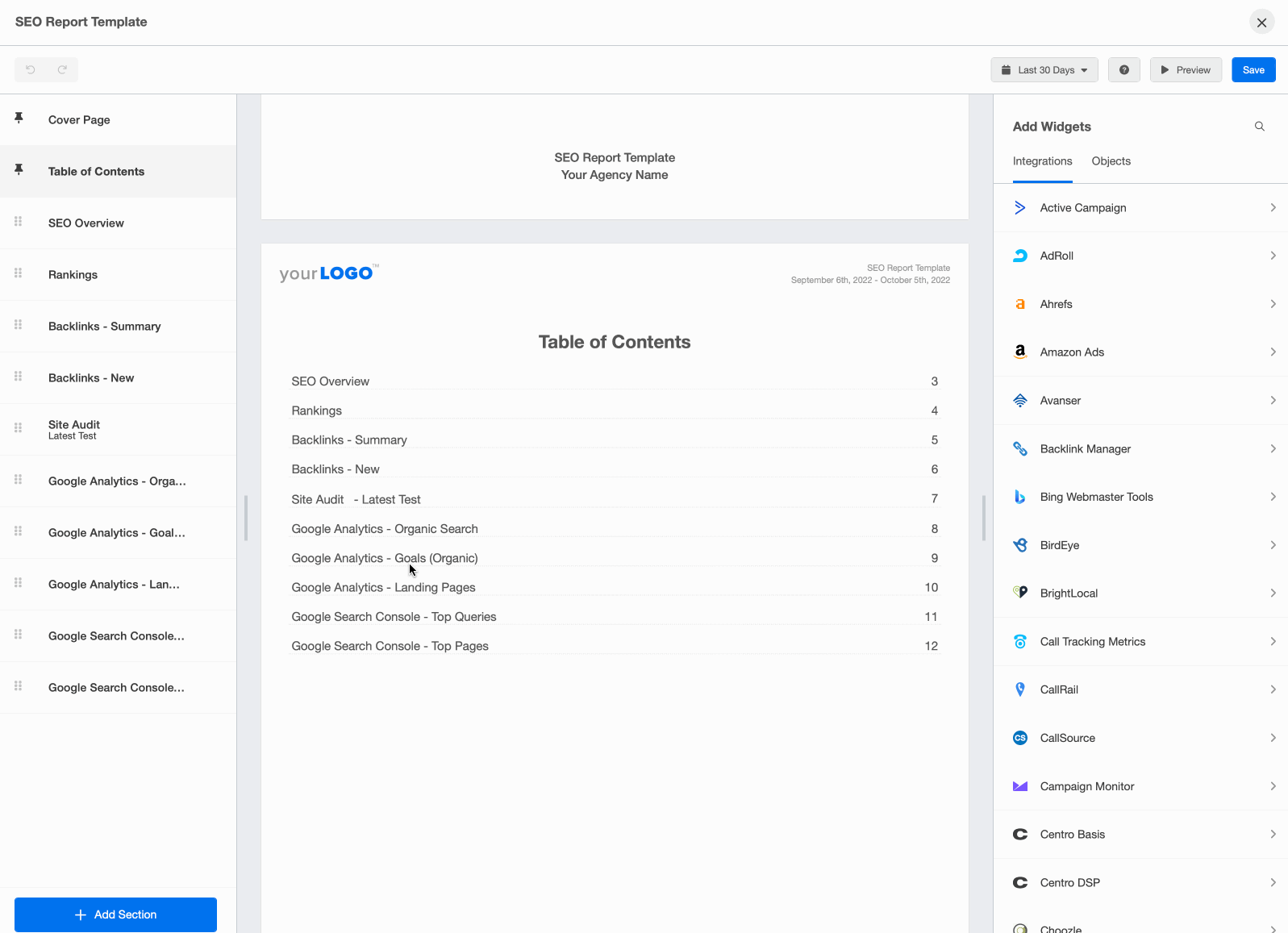
Attract and retain clients with clear and easy-to-understand reports, built in minutes. Try this SEO Report template in AgencyAnalytics, one of the many pre-built client report templates available.
The state of AI in search
AI is now at the center of search. Google’s Search Generative Experience (SGE) shows AI overviews on more than 1 in 10 U.S. searches, and usage is climbing.
These AI-driven overviews expand the search results, add context, and guide users toward related topics on the search engine results page—often taking up half the page. For many people, it feels less like typing search queries into a bar and more like having a conversation with an assistant.
The emergence of Generative AI in search is both exciting and transformative. It allows searchers to ask more nuanced and conversational questions, similar to having a dialogue with a real person. This shift towards natural language queries means SEO strategies will need to evolve, focusing more on understanding user intent rather than just specific keywords.
Stephan Moerman, Co-Founder, Bakklog
AI also drives how search engine rankings are determined. Google has layered AI into its search algorithms for years—RankBrain, BERT, MUM, and SpamBrain all show the same trend: smarter evaluation of search intent, context, and content quality.
Search engines are getting closer to how humans evaluate relevance, as they try to ensure users interact with content that matches the user’s search intent.
For agencies, this means SEO strategies need to perform on two levels: traditional search engine optimization for rankings and AI-powered experiences layered on top. Structured answers, credible expertise, and technical excellence earn visibility in both.
The future is here: LLMs and AI-powered search
Search is shifting from keyword lookups to conversations. Large Language Models (LLMs) like OpenAI’s GPT-5, Google’s Gemini, and others are powering assistants that understand intent and context at a level we’ve never seen before.
This changes how people interact with information.
Instead of a short query like “best running shoes,” users are now comfortable asking: “I need trail shoes for flat feet under $150 that hold up in wet conditions. What should I buy?”
That one prompt can replace several traditional searches, and the AI delivers a curated answer in seconds.
In 2023, Bill Gates said bluntly, “The technology race to win is the development of the top AI agent… you’ll never go to a search site again.”
While the future isn’t fully here yet, the direction is obvious: AI agents are on track to handle discovery, comparison, and even transactions.
For marketing agencies, this opens new opportunities. Optimizing for LLM-powered search means:
Structuring content so it’s easy for models to parse, cite, and recommend.
Investing in authoritative content that positions your client’s brand as a trusted source when an assistant surfaces answers.
Thinking beyond links, as APIs, structured data, and well-marked product information help AI assistants pull the correct details.
Search is evolving into a personalized, always-on assistant. Adapting early by aligning content with LLM-driven discovery will help agencies stand out as these platforms become a regular part of daily life.
7 SEO trends driving your results in 2025
Every year brings a fresh set of predictions for the future of SEO. The difference in 2025 is that the changes are already baked into how people search, how algorithms surface content, and how agencies and clients measure success through user engagement metrics.
The following trends show where agencies need to focus right now. They highlight what’s driving visibility in search, how AI is reshaping discovery, and why brand signals carry more weight than ever.
1. LLM and AI platform adoption will continue to steal Google's market share
Search is no longer synonymous with Google. For the first time in a decade, Google’s global search share dipped below 90% in late 2024.
That’s still dominance, but it signals a fundamental shift: Users are exploring alternatives powered by large language models (LLMs) and discovery tools. Perplexity, another AI-powered engine, also reported 71% month-over-month growth in late 2024.
By mid-2025, ChatGPT accounted for 9% of global digital queries while Google held about 82%. For a platform less than three years old, that level of adoption shows how quickly user behavior is evolving.
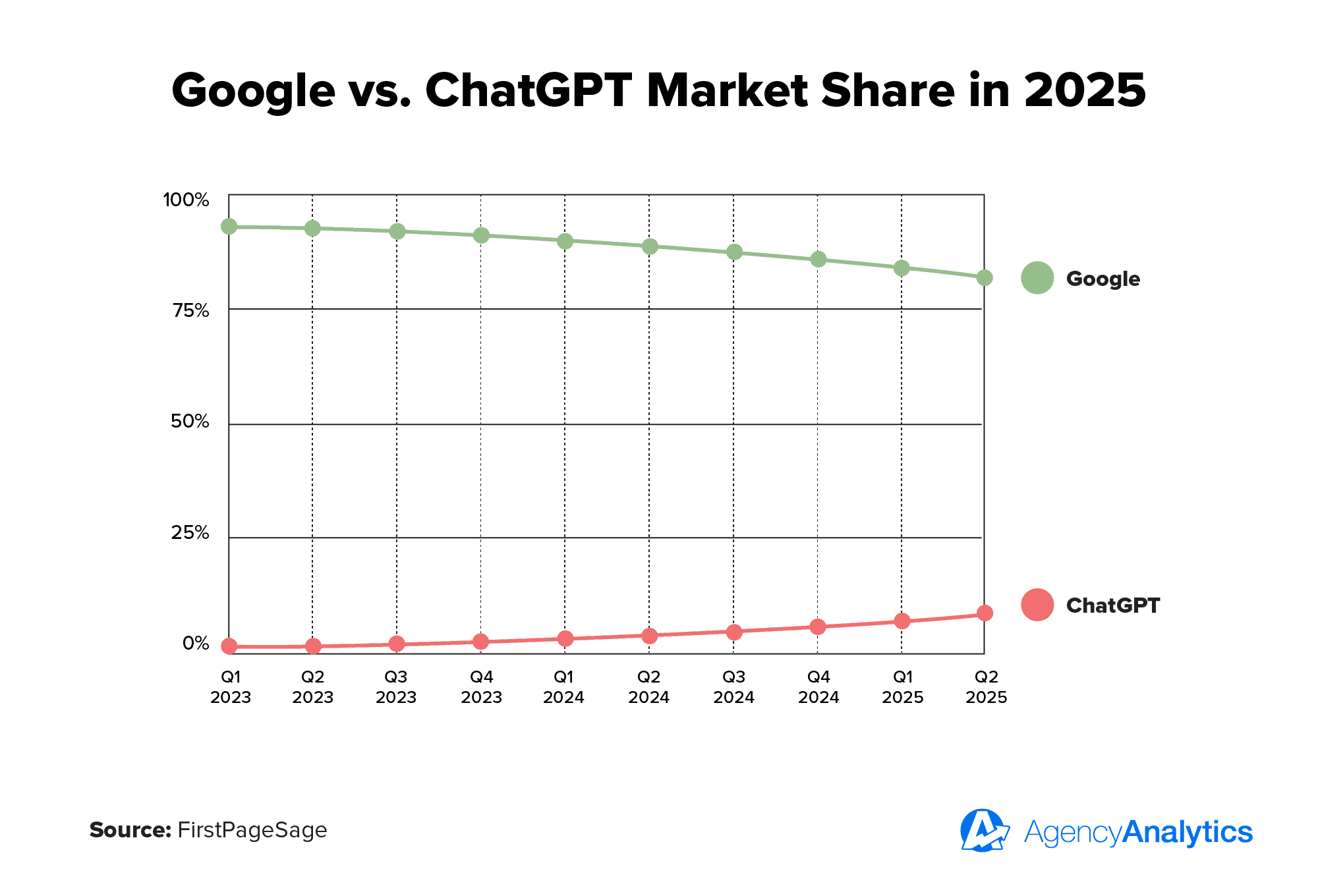
For agencies, the priority is expanding visibility across these platforms by:
Indexing with Bing Webmaster Tools: Both ChatGPT Search and Perplexity rely heavily on Bing’s web index—along with their own crawlers—to generate answers. Getting clients indexed on Bing increases the odds of being cited in AI-powered results.
Tracking AI mentions: Experiment with AI tools like Otterly.ai and Peec AI to monitor when brands are included in AI answers.
Structuring for Answer Engine Optimization (AEO): Use schema markup and Q&A formatting so AI systems can parse and cite content more easily.
Expanding content reach: Optimize for multiple entry points—AI assistants, social discovery platforms, and voice search—alongside Google.
2. AI overviews continue to dominate organic search
AI-generated summaries now take up prime real estate at the top of Google results.
Studies from Ahrefs and Amsive found that when an AI overview appears, the top organic listing loses about 35% of its click-through rate. Across hundreds of thousands of queries, the average organic CTR dropped 15% with AI overviews present, and some categories saw drops above 30%.
AI summaries are long, detailed, and designed to anticipate related questions. As Adweek notes, they often expand into half a page of content, leaving traditional listings below the fold.
AI summaries now resolve most queries on the spot. Nearly 60% of Google searches end without a click, and in categories like news, zero-click searches have surged to 69% since AI overviews rolled out.
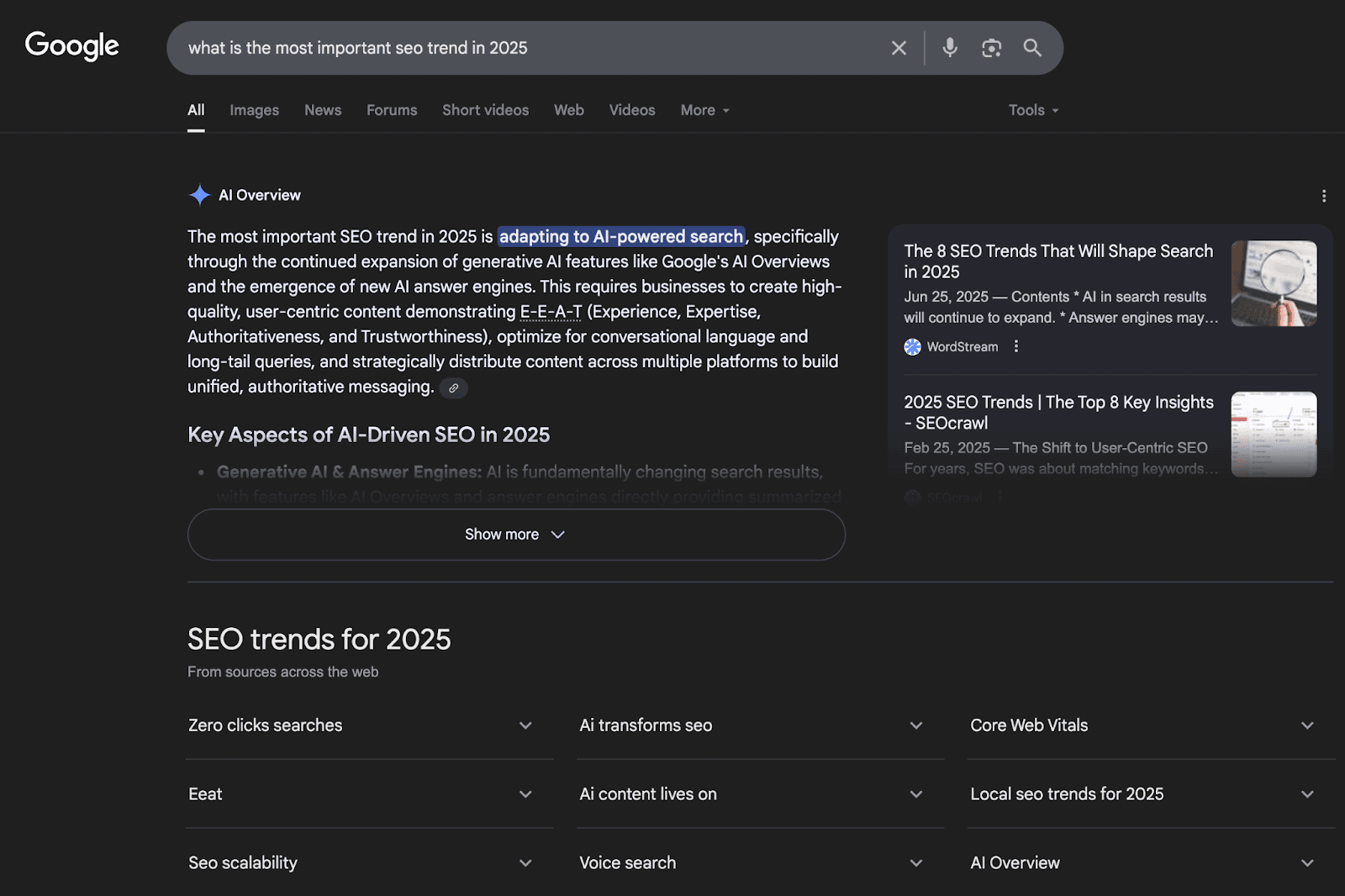
For agencies, this changes how SEO performance is measured via Google Analytics and Google Search Console. Lower click-through rates don’t erase value if your client’s content is cited in the AI answer. The information still reaches the target audience—just through a new delivery path.
For agencies and their clients, this means:
Auditing SERPs for AI overviews: Use automated tools like Ziptie or manual testing to see which queries trigger AI results and whether your clients’ content is included.
Optimizing for AI citation: Structure content with clear sections, highlight key stats, and apply schema markup. AI systems often draw from the top 3-5 organic results.
Adjusting reporting frameworks: Show clients how branded search growth, direct traffic, and mentions complement rankings in an AI-driven SERP.
Creating content AI won’t replace: Tools, calculators, interactive visuals, and original research provide value that can’t be summarized in a single overview.
3. The way searchers use web browsers is evolving
Search is moving beyond Google and into the browsing experience itself.
Microsoft has been weaving AI into Edge with Copilot, accessible from the sidebar. This gives users instant answers, comparisons, and summaries without opening a new tab. Google is also testing Gemini inside Chrome, allowing users to highlight text or ask questions directly in the browser.
These integrations mean users search in context—right where they are, without navigating to a separate search engine. Highlighting, right-clicking, or voice prompts are becoming natural ways to query information.
Many of these interactions aren’t counted as traditional searches, yet they influence how content gets discovered.
At the same time, younger audiences continue to shift behavior, especially on mobile.
Platforms like TikTok and YouTube have become primary discovery engines, while desktop users increasingly rely on browser-native AI for quick context.
For agencies and their clients, this means:
Tracking non-Google entry points: Add TikTok and YouTube data to client reporting to capture where discovery begins.
Optimizing for in-browser AI: Create clear, context-rich snippets that browsers can lift directly into AI summaries.
Testing visibility in browser features: Check how client content appears in Chrome Gemini and Edge Copilot AI panels.
Educating clients on evolving search paths: Position search visibility as spanning browsers, apps, and SERPs rather than just Google search rankings.
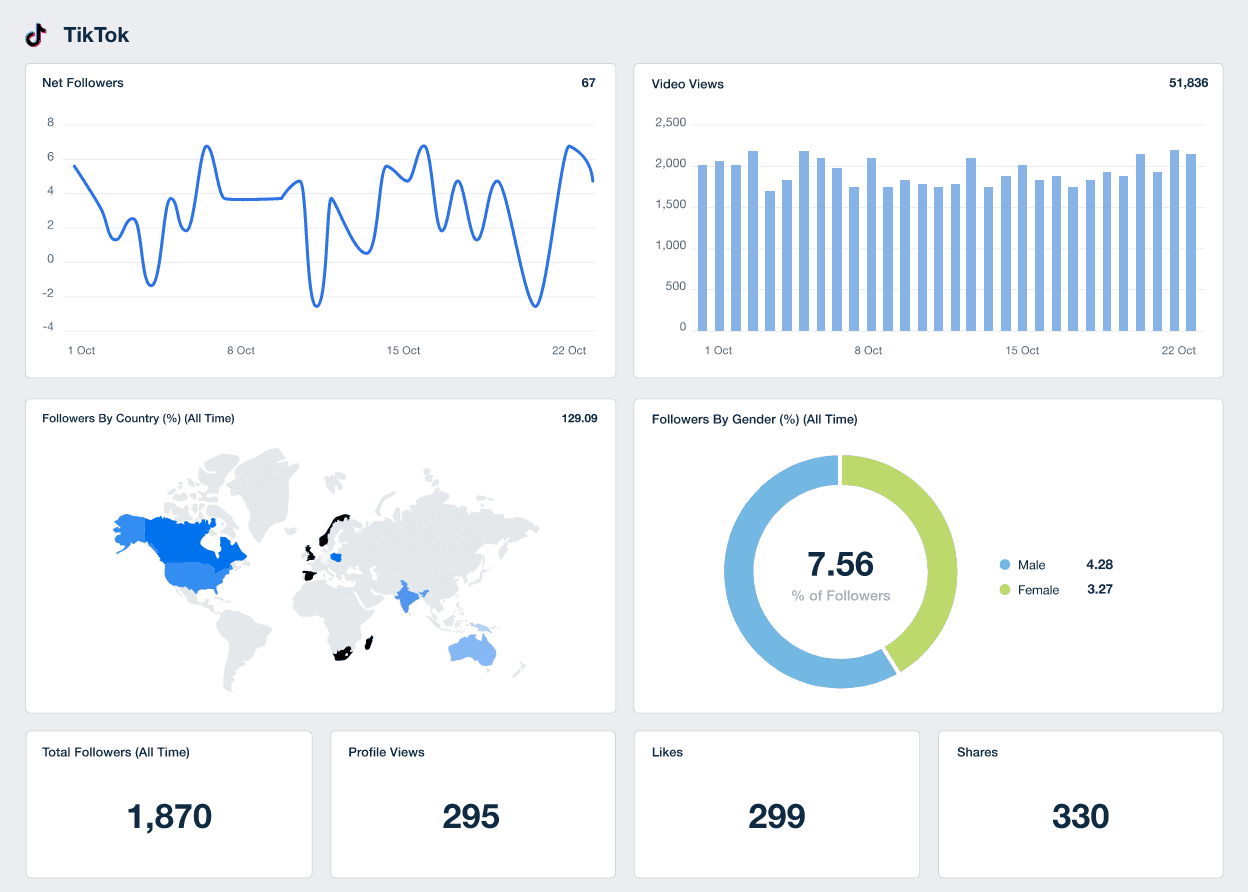
Show clients where discovery really starts. Track TikTok performance alongside SEO in a comprehensive, visual report. Try AgencyAnalytics for free today!
4. SEO is not dead, but the old playbook is
Every few years, someone declares SEO dead. In 2025, SEO is alive and well, but it runs on authority and trust.
What’s really dead is the shortcut-driven playbook.
AI-driven ranking systems like SpamBrain and the Helpful Content Update have pushed low-value, keyword-stuffed content out of sight. Google is rewarding depth, originality, and expertise—signals that show real people created content for real audiences.
AI overviews and LLM-powered assistants are also forcing agencies to rethink what “ranking” means.
Visibility doesn’t just come from a #1 blue link anymore. It comes from being cited in an AI answer, surfaced in a browser-integrated panel, or discovered through social media platforms and community search.
For agency leaders, this is an opportunity to reset the conversation with clients. The metrics that matter most—visibility, brand mentions, authority signals—align more closely with long-term client outcomes than raw traffic alone.
Embrace the change and focus on user-friendly, intent-driven content with long-tail keywords rather than creating content for algorithms.
Khurram Shahzad, Founder & CEO, Digilatics
Here’s where agencies should focus their SEO efforts with clients:
Audit for thin content: Remove or consolidate outdated posts that don’t add value. Google’s systems now actively devalue this type of content.
Double down on E-E-A-T (Experience, Expertise, Authoritativeness, and Trustworthiness): Publish content with clear authorship, credentials, and original insights to build authority.
Expand reporting beyond rankings: Show clients AI citations, brand mentions, and community visibility alongside organic traffic.
Invest in formats AI can’t replicate: Proprietary data, case studies, tools, and visuals provide unique value that automated summaries can’t deliver.
5. Brand authority becomes the strongest SEO signal
Google is increasingly weighing brand signals in rankings. Mentions, reviews, and reputation cues now matter as much as backlinks in determining which sites get surfaced.
Internal experiments and industry analyses suggest that brand authority has become one of the strongest trust signals feeding organic results and AI overviews.
In a world where AI systems synthesize content, search engines need reliable credibility markers.
A recognized brand is harder to fake than a keyword-rich domain or a manufactured backlink profile. Strong brand presence helps validate expertise and relevance, even when traditional signals are equal.
For agencies, building brand authority now sits at the center of SEO. That means shaping visibility across multiple discovery channels to reinforce consistent signals of trust:
Build digital PR campaigns: Secure brand mentions in credible publications and niche outlets for backlinks and authority signals.
Encourage activity on review platforms like Google, Yelp, G2, and Trustpilot: Reviews, ratings, and unlinked brand mentions are critical authority signals. These inputs form the basis of Generative Engine Optimization (GEO)—building the signals AI engines use when generating brand mentions in answers.
Strengthen branded search: Track and grow branded queries as a leading indicator of authority.
Align SEO with reputation management: Monitor sentiment and mentions across discussion forums and social media platforms. Authority is shaped where conversations happen.
Agency tip: Our guide to SEO tracking outlines the best ways to capture these new signals in client reports.
6. Social and community search are reshaping discovery
As mentioned earlier, discovery increasingly begins on TikTok, YouTube, Reddit, and other social platforms. What matters for agencies is how these channels now surface directly in Google results.
For agencies, this shift means treating social platforms and forums as part of the search mix.
Invest in TikTok SEO and YouTube optimization: Align titles, captions, and hashtags to native query patterns users type inside apps.
Engage where communities ask and answer: Build presence on Reddit with helpful, transparent contributions that stand on their own.
Track SERP placement of community content: Monitor when forum threads or social posts appear alongside brand pages to guide content and PR moves.
Leverage structured data and user-generated content (UGC): Use Google’s discussion/profile markup where relevant, and consider community sections on owned properties to capture long‑tail discovery.
7. Measurement is shifting beyond clicks
Reporting now reflects how visibility works in an AI-driven world. Agencies must show clients growth in branded search, inclusion in AI answers, and mentions across social and community platforms as core KPIs.
With a majority of Google searches now ending without a click, that doesn’t mean brands lose visibility—their information still reaches audiences through AI summaries and citations.
As an SEO consultant, accurate client reporting is essential to be able to evaluate how well various SEO strategies are working.
Kelly Fitzgerald, Founder, Savvy Marketing Services
By reframing SEO reporting around visibility and authority—not just organic search traffic—agencies give clients a more accurate picture of impact:
Report branded search and mentions: Track branded queries and citations in AI overviews, as well as brand mentions on social media and discussion forums.
Show share of voice in SERPs: Measure how often client content appears in organic listings, AI panels, and community results.
Highlight authority signals: Incorporate reviews, ratings, and unlinked brand mentions as key KPIs.
Educate clients on new KPIs: Position visibility and authority as long-term growth drivers, complementing traffic and conversions.
Tools like AgencyAnalytics help agencies collect these signals, making it easy to showcase branded queries and authority metrics in client dashboards.
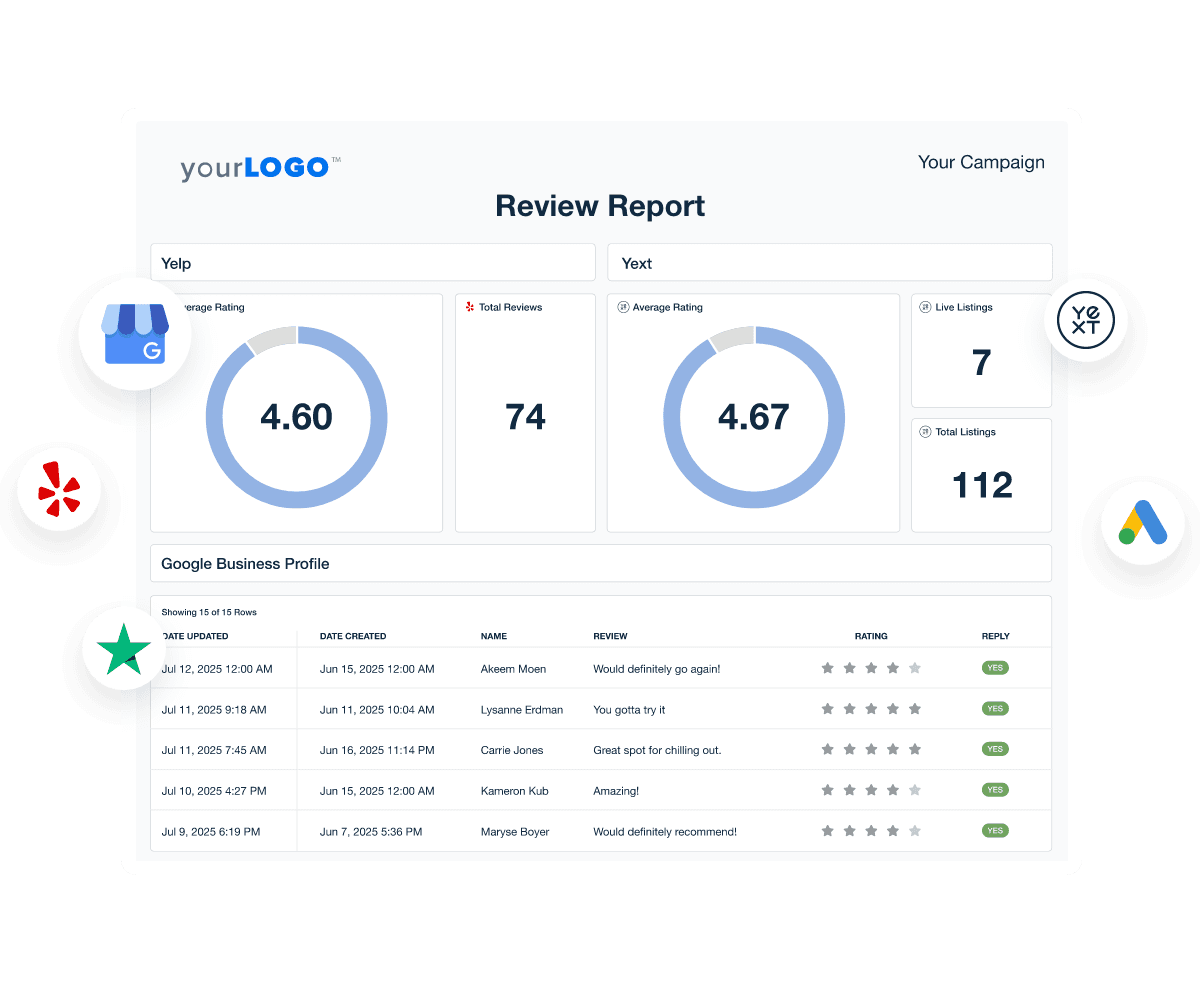
Automatically integrate review scores, online mentions, and sentiment trends from Google Business Profile, Yelp, Trustpilot, and more with a reputation management dashboard. Try AgencyAnalytics free for 14 days.
Outdated SEO practices to leave behind
Some habits linger long after they’ve lost their value. In 2025, a few actively hurt performance.
Keyword stuffing and over-optimization
Cramming a page with repeated phrases used to feel like insurance for rankings. Now it’s a red flag. Over-optimizing around a single “focus keyword” and an inflated word count wastes effort when Google interprets context and intent across an entire query.
Thin and mass-produced content
The flood of AI-generated content has made originality and authority more valuable than ever. Google has made it clear that low-value, templated content is devalued under its Helpful Content guidelines.
Instead of publishing dozens of near-duplicate posts, agencies should consolidate weaker client assets into evergreen hubs and create high-value content supported by proprietary client data or expert insights.
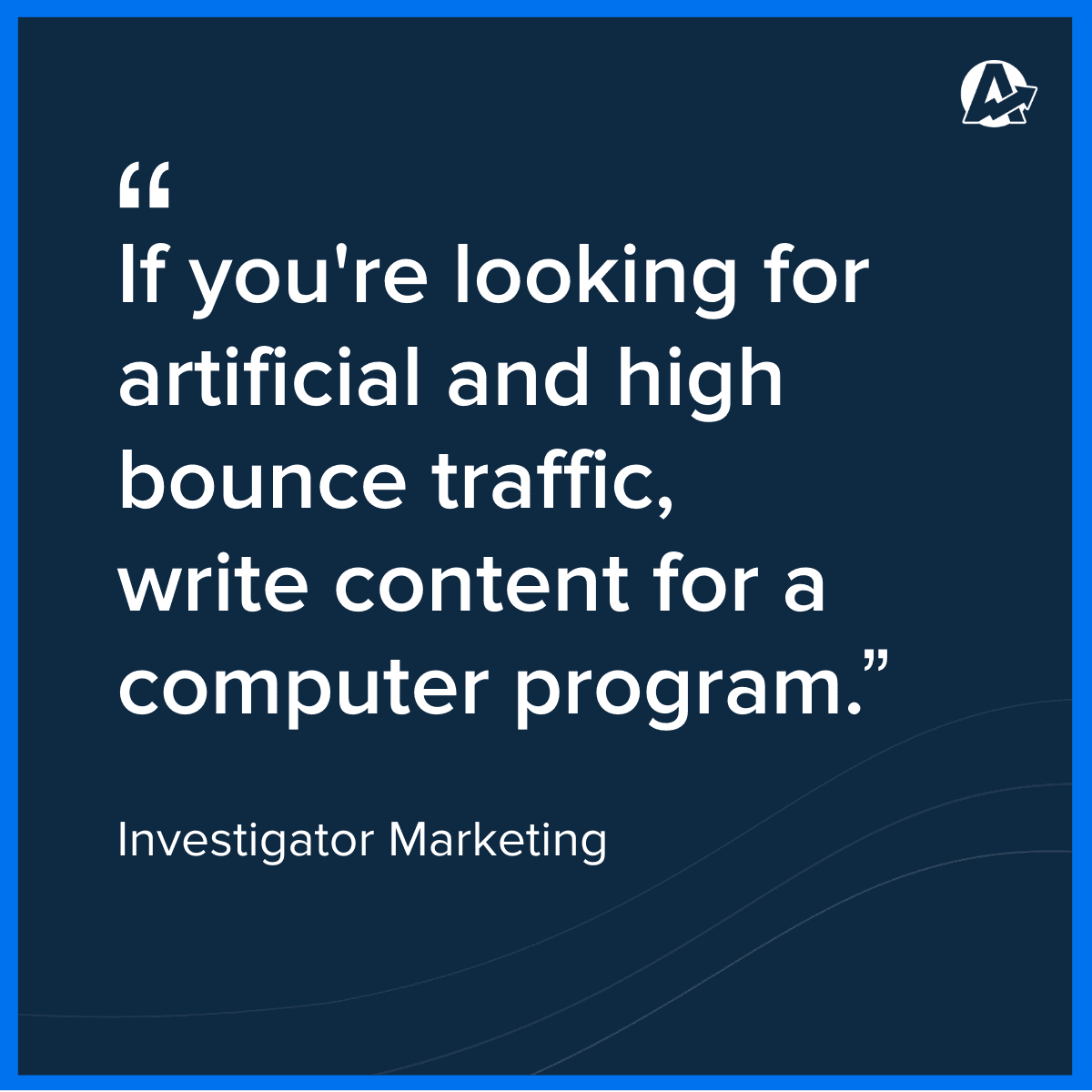
Link schemes and shortcuts
Link buying and exact-match anchor schemes aren’t harmless tricks anymore. Google continues to expand its link spam policies, making manipulative backlinks a liability.
What consistently works is earning mentions through digital PR, original research, and placements in trusted outlets—the kind of signals algorithms treat as proof of authority.
Improper use of backlinks can absolutely cook a website. Low-quality referring domains, keyword stuffing, unnatural backlinks, unrelated domains, poor anchor text usage, poorly developed content.... the list goes on. If you don't know what you're doing you can really hurt your rankings.
Matthew Cernik, Head of SEO, King Kong
Neglecting user experience
User experience now directly shapes search visibility. Google evaluates speed, mobile responsiveness, and accessibility through Core Web Vitals.
Sites that ignore structured data, design clarity, or accessibility benchmarks get outranked by competitors who meet the baseline.
Impress clients and save hours with custom, automated reporting.
Join 7,000+ agencies that create reports in under 30 minutes per client using AgencyAnalytics. Get started for free. No credit card required.
Already have an account?
Log inPreparing for the AI tech revolution
As scary or confusing as the AI shift may seem, SEO's role is still expanding.
Visibility now includes being cited in AI answers, showing up in browser assistants, and surfacing in conversational platforms, alongside traditional SERP placements.
Agencies must be able to show clients that authority and presence stretch across these spaces. Knowing how to forecast SEO performance to guide client strategy will continue to be crucial.
As Moz and SparkToro founder Rand Fishkin pointed out in 2021, “If you want to build something that can stand out from the crowd … build a brand people seek out.”
Inside agencies, teams are building new rhythms. Technical specialists, content creators, and PR strategists are working more closely together, making sure clients’ stories are told in ways that AI systems recognize and audiences trust.
Client conversations are also taking on a different tone. Agency leaders are talking less about rankings in isolation and more about where and how their clients’ brands are seen.
Adapting to Generative AI in search presents several challenges for agencies, including the need to overhaul traditional SEO strategies to focus more on user intent and natural language processing. There is also the challenge of producing higher-quality, in-depth content that meets the sophisticated demands of AI-generated queries.
Stephan Moerman, Co-Founder, Bakklog
Preparing for the AI revolution in SEO is about building adaptability into the heart of agency work. Agencies that embrace collaboration, authority, and education will help their clients stay visible in a world where discovery is happening everywhere.

Written by
Francois Marchand brings more than 20 years of experience in marketing, journalism, content production, and artificial intelligence (AI). His goal is to equip agency leaders with innovative strategies and actionable advice to succeed in digital marketing, SaaS, and ecommerce.
Read more posts by Francois MarchandSee how 7,000+ marketing agencies help clients win
Free 14-day trial. No credit card required.



